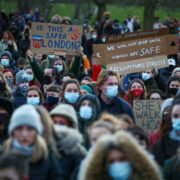Are Women Safe On Our Streets?

Our rape alarms will not save us from sexual assault. The police and the government need to take violence against women more seriously.
When the politicians that rule this country and the police that protect it fails to safeguard the people that live, work and exist to make this plot of land a home. The sirens must go off and there must be an immediate call to action to find the solution.
Over the last few weeks, conversations around sexual assault and violence against women have sparked outrage across the nation. Following the tragic killings of Sarah Everard and Sabina Nessa, we must ask ourselves how long we are willing to live in a country that continues to accept the institutional and social culture of rape.
Sexual violence against women and girls is not an epidemic. As we watch, politicians and metropolitan police scramble for solutions that can at least provide as some kind of lip service to distract the general public. Those who have paid close enough attention to all talk around women’s rights will roll their eyes and sigh in deep frustration as the redundant advice is charted out to women and girls across the country.
From promises of the distribution of rape alarms, more lighting and police officers patrolling the streets. As well as the ridiculous and frankly worrying advice from the highest-ranking officer in the country; Cressida Dick, Commissioner of the Met Police who suggested to ‘wave down a bus’ if in danger.
With advice like this, it is no surprise that the already dwindling trust amongst women and these institutions created to protect us has completely plummeted. The reality is that you can be the kind of woman who does their best to get home before dark, carries a rape alarm and is a level-seven in self-defence. Unfortunately, none of the aforementioned will protect you from sexual violation.
It is a shame to admit, that a 22:00, walk to my home without any hassle, feels more like the luck of a draw than any preemptive measures I have made to make myself less likely to be the victim of a man’s sexual violence.
Take the case of Sarah Everard, who at 33, was on her way home and encountered not a stranger lurking in the alleyway but a police officer. On the 3rd March 2021, Wayne Curzon targeted Sarah Everard as she walked home from a friend’s house in South London. Under the guise of a false arrest, Curzon had Sarah in his car, which he then drove to a secluded area in Kent, where he parked the car, raped Sarah Everard, strangled her to death with his police belt, burned her body in a refrigerator in an area of woodland he owned in Hoads Wood, near Ashford, before dumping the remains in a nearby pond.
The tragedy of this horrific crime sparked outrage across the country and since then, Curzon has been sentenced to a whole-life sentence. A sentence that is one of the most severe in Britain’s criminal justice system.
The Crime Survey for England and Wales in 2020 revealed that women are more likely to be the victims of sexual assault and rape than men. An alarming, 4.9 million women in the survey said they had been sexually assaulted at some point in their lives, 1.4 million of these women had been the victim of rape or attempted rape. However, I call to question if the same level of justice and punishment for Sarah Everard’s case will be applicable to the thousands of sexual violence cases against women reported every year.
Check out the GUAP Arts & Culture section, to discover new art, film, and creative individuals.




![ZINO VINCI’S ‘FILTHY & DISGUSTING’EP BRINGS YOU TO THE CORE OF THE ARTIST [@ZinoVinci]](https://guap.co/wp-content/uploads/2023/10/Zino-4.jpg)





![Remel London’s [@Remel_London] “Mainstream” is a must attend for upcoming presenters!](https://guap.co/wp-content/uploads/2017/02/REMEL-LONDON-FLYER-FINAL-YELLOW-COMPLETE-1.png)